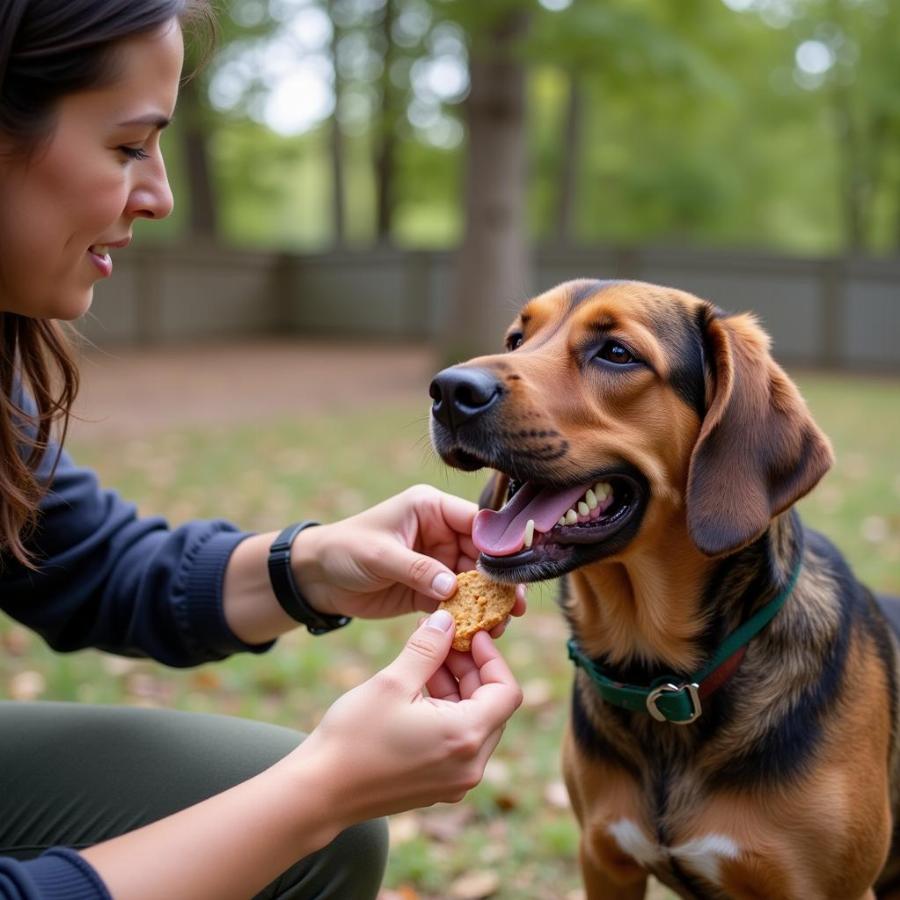A dog growling at nothing can be unsettling. Is your furry friend seeing ghosts? Probably not. While it can seem mysterious, there are several reasons why your dog might be growling seemingly at nothing, and understanding these causes is the first step to addressing the behavior. This article explores the potential triggers behind this behavior and offers practical solutions to help you and your canine companion navigate this situation.
Decoding the Silent Growl: Why Does My Dog Growl at Nothing?
Dogs communicate in various ways, and growling is a natural vocalization. It’s their way of expressing a range of emotions, from fear and anxiety to territoriality and even pain. So when your dog is growling at seemingly nothing, they are actually trying to tell you something. Let’s delve deeper into the potential reasons.
Medical Reasons Behind Phantom Growls
Sometimes, unexplained growling can be a sign of underlying medical conditions. Cognitive Dysfunction Syndrome (CDS), similar to dementia in humans, can cause confusion and changes in behavior, including seemingly random growling. Pain can also manifest as growling, particularly if your dog is experiencing discomfort they can’t pinpoint or communicate directly.
Sensory Overload and Phantom Growls
Dogs have much more sensitive hearing and smell than humans. They might be reacting to high-frequency sounds we can’t hear, or subtle scents carried by the wind. This sensory overload can lead to anxiety and growling.
Territoriality and Phantom Threats
Even if you don’t see a threat, your dog’s keen senses might detect something outside your home, like another animal or unfamiliar noises. This can trigger their territorial instincts, resulting in growling.
Addressing the Growling: Practical Steps and Solutions
Identifying the cause of the growling is key to addressing it effectively. Here are some steps to take:
-
Veterinary Checkup: The first step is to rule out any medical issues. Schedule a visit with your veterinarian for a thorough examination.
-
Environmental Enrichment: Create a safe and comfortable environment for your dog. This might include a designated quiet space where they can retreat when feeling overwhelmed. Consider using white noise machines or calming music to mask disturbing sounds.
-
Behavior Modification: If no medical cause is found, consult a certified dog trainer or behaviorist. They can help you identify the triggers and implement behavior modification techniques to address the growling.
 Training a dog to stop growling
Training a dog to stop growling
Expert Insights: Dr. Emily Carter, DVM
“Unexplained growling should never be ignored,” advises Dr. Emily Carter, a renowned veterinarian specializing in canine behavior. “It’s crucial to investigate the root cause to ensure your dog’s well-being and address any potential underlying issues.”
How to Prevent Phantom Growling: Proactive Strategies
Proactive measures can help prevent phantom growling. Regular exercise and mental stimulation can reduce anxiety and boredom. dog is growling at nothing can sometimes indicate a need for more structured activity.
Expert Insights: Karen Johnson, Certified Dog Trainer
“Positive reinforcement training can be incredibly effective in managing unwanted behaviors like growling,” says Karen Johnson, a certified dog trainer with over 20 years of experience. “Rewarding calm behavior helps your dog learn appropriate responses to their environment.”
Conclusion: Understanding Your Growling Companion
A dog growling at nothing is often a sign of something more than just a quirky behavior. By understanding the potential causes and implementing appropriate solutions, you can help your furry friend feel more secure and comfortable. Remember, patience and professional guidance are key to addressing this issue and strengthening the bond with your beloved companion.
FAQ: Common Questions about Dog Growling
-
Is growling always a sign of aggression? No, growling can express various emotions, including fear, anxiety, pain, and territoriality.
-
Should I punish my dog for growling? Never punish a dog for growling. It suppresses their communication, which can lead to more problematic behaviors.
-
Can phantom growling be a sign of a serious medical condition? Yes, it can be a symptom of conditions like CDS or pain. A veterinary checkup is crucial.
-
How can I help my dog feel safer in their environment? Create a quiet space, use white noise, and provide plenty of mental and physical stimulation.
-
When should I seek professional help for my dog’s growling? If the growling persists or escalates, consult a certified dog trainer or behaviorist.
Further Reading
Are you interested in learning more about dog behavior? Check out these articles: fence dog ears, dog cries in sleep, why do dogs whimper in their sleep, why is my dog’s stomach growling.
Beaut Dogs: Your Comprehensive Guide to Canine Care
Beaut Dogs is your one-stop resource for all things related to dog ownership. We provide expert advice and guidance on everything from breed selection to health care, training, and nutrition. When you need support, please contact us via Email: [email protected] to receive detailed and accurate answers from Beaut Dogs. Visit https://beautdogs.com today to explore the wonderful world of dogs and learn how to care for them best!